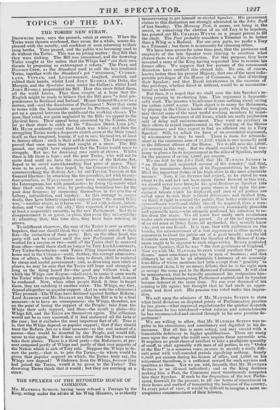TOPICS OF THE DAY.
THE TORIES' NEW STRAW.
DROWNING men, says the proverb, catch at straws. When the Tories were thrown overboard, they swam for a while, scarce dis- -pleased with the novelty, and confident of soon returning to their snug berths. Time passed, and the public was becoming used to do without the Tories. This was no joking matter : they felt that they were sinking. The Bill was announced, and the drowning Tories caught at the notion that the Whigs had " cut their own -throats by proposing so extravagant a reform." The PEEL and DAWSON Crew, as the Standard used to call the less irrational ' Tories, together with the Standard's pet "statesmen," CUMBER- . LAND, VYVYAN, and 'LONDONDERRY, laughed, shouted, and rubbed their hands, whilst Lord JOHN RUSSELL (the Duke, the Marquis, and the Spectator were under the Gallery), whilst Lord JOHN RUSSELL propounded his Bill. How this straw failed them, all the world knows. They then caught at a hope that the English might be made to believe that the Bill gave "a fatal pre- ponderance to Scotland and Ireland." Hence General GASCOYNE'S motion, and—and the dissolution of Parliament ! Next they came to terms with the honourable member for Preston, and strove to get up a quarrel between the middleand the working classes. The poor, they cried, are quite neglected by the Bill: we appeal to the physical force. Their appeal being answered by the Unions, they let go their straw to catch at the "Russian Dutch Loan job.' Mr. HUME prudently voted that black was white ; and then the struggling Tories made a desperate clutch even at the State vessel itself, as they imagined, hoping, if not to save themselves, at least to destroy &hers : such is their selfish nature. The Interregnum proved that • once more they had caught at a straw. The Bill passed, one might have supposed that the Tories would cease to struggle. But no; for drowning men catch at straws. Whilst there is life there is hope ; and the poor Tories, who will not be quite dead until we have the consequences of the Reform Act, hoped to be saved notwithstanding- that piece of paper. They were to be saved, so they hoped, by the Conservative Club; by counterworking the Reform Act ; by out-Torying Tory ism at the General Election ; by attacking the ten-pounders, not with twenty- four-pounders, as WELaixerox may have contemplated during the Interregnum, but with pound-notes; by doing vigorously what they liked• with their OWD; by professing boundless love for the poor dear farmers; by surpassing themselves in the practice of bribery, intimidation, and cajolery. In this attempt to escape death, they have latterly expected support from "the horrid Whie. war,"—another straw, as it turns out. 'What with bribery, intimi- dation, and "our dear old ally," they expected, if not a majority, at least a respectable minority, in the new Parliament. But their disappointment is so great, so plain, that even they acknowledge it; admitting that, this time also, they have been catching it straws.
To indifferent observers, the case of the Tories is now so utterly hopeless, that one should think they would submit quietly to their fate—the extinction of their party. But, on the other hand, the party will not be extinct until the new Parliament shall have worked for a session or two—until all the Tories shall be removed from office—until there shall no longer be Tory Lord-Lieutenants, Tory Under-Secretaries—rank Tories filling important stations at home and in the Colonies—until, further, the corrupt administra- tion of affairs, which the Tories long to direct, shall be replaced by cheap and useful government: and, as drowning men catch at straws, we may be sure that the Tories will hope and struggle so long as the thing hoped for—the good pay without work, of which the Whigs now dispose—shall exist, to make it seem worth the Tories' while to struggle for power. They do die hard, it must be confessed. Now, when other people think it time to forget them, they are catching at another straw. The Whigs, say they, dependaltogether on popular support. (Let us note the admission.) They proceed—The Whigs have declared against further Reform ; Lord ALTHORP and Mr. STANLEY Say that the Bill is to be a final measure—is to have no consequences: the Whigs, therefore, are on the point of losing the support of the People : take from the Whigs their only support, and then—the result is plain—the Whigs fall, and the- Tories are themselves again. The syllogism would not be so very unsound, if it had embraced all the facts of the ease; but it excludes the most important fact of all. True it is, that the Whigs depend on popular support; that if they should treat the Reform Act as a final measure—as the end instead of a means—they would be deserted by the People, and would fall, never to rise again. But it does. not follow that the Tories would take their places. There is a third party—the Reformers, at pre- sent composed partly of Whigs and partly of that vast majority of the Nation which is sick of Tory rule. Suppose the Whigs to de- sert the party,—that is, to join the Tories,—to whom would be given that popular support on which, the Tories truly say, the Whigs now depend? Withdrawn. from the Whigs, because they had joined the Tories, would it be given to the Tories? The drowning Tories think that it would; but they are catching at a -straw.






















 Previous page
Previous page